Bernat Farrero’s webinar transcription on how to enable remote work in your team.
What does it take to build the business?
Usually, it’s a two-variable formula, so you need to have the right idea, which is the most important thing because there’s nothing worse than executing the wrong idea. That’s going to be one percent of the effort. The other 99 percent of the effort is how you communicate it since you’re not building a business by yourself alone. You’re in an ecosystem with more people.
So, how do you communicate this idea to other people? This is where 99% of the effort will go. Your ability to be able to communicate what you have in your mind to investors, to suppliers, to clients, to banks, and especially to your employees, is gonna be the definite key to success.
Basically, I take into account 10 important things to lead my team.
10 tips for leading your team in times of crisis
- Plan
- Goals
- Empowerment
- Trust
- Mistakes
- Training
- Encouragement
- Simplification
- Metrics
- Knowledge
Make a Plan
First, make a plan. Without a plan, everyone will go in different directions. You have to ask yourself what you want to do, and take into account that you cannot do everything. Making a plan means also giving up things. Also, you have to make sure that everybody buys in. You cannot make a different plan for each of your employees in your organization. You make one single plan and you are going to execute it and all your team has to buy-in.
More importantly, if your people can’t understand the plan or don’t see it, the plan means nothing inside your mind. You have to be able to communicate. The good news is you can learn how to communicate. It’s something that many people face and you can learn from it.
Goals
The second step is setting goals. It’s very important to take the plan and split it into goals for every team and every individual. This is an exercise that has to be done with the teams as well. You have to talk about goals every day. Goals are like the North Star. We have to measure everything we’re doing against goals. What are the goals for each team? For each individual?
Empowerment & Trust
Third, empowerment. You have to trust people. It’s no longer time for controlling your employees. That makes no sense whatsoever. Especially now everybody’s working at home. You better trust your people. This is a process that is very easy to say and very hard to do. Empowerment means giving the ownership to this person, make your goals their goals, aligning their personal interests with their professional interests. They must have goals to make their own decisions.
You are hiring talent because you trust this talent. You’re not hiring people not to trust them. So you have to hire the top talent and then empower them. That takes trust. That is a very important part of making companies grow and thrive. If you don’t trust your team, teams are not going to trust each other. People in Marketing are going to tell you that sales are not doing their job properly, Sales are going to tell you that the Product doesn’t work, and so on.
Hence, we have to create a culture of trust. We have to trust each other: team members and the other teams, everybody in the organization. That starts with you, as a leader, trusting your own team.
Mistakes & Training
If there are no mistakes, it means nobody’s taking risks. You have to encourage mistakes. We’re not stupid. We’re making mistakes to learn. That is a way to grow: making mistakes and learning fast from them. The knowledge won’t come up from anywhere. You have to look for it, you have to structure the knowledge, the learnings, and you have to continuously train your team. Also, as a leader, you need to have a role as a person who finds information wherever it is and brings it to the team continuously all the time.
Encouragement
You need to encourage your team. Encouraging your team is underlying the things that are going good, maybe exaggerating the victories, making sure that everybody knows when things go right. This is very important, especially now when we’re all at home. This is key for the team’s emotional wellbeing inside the company.
Simplification
You need to create a pyramid of truth as a leader. You need to simplify, find the essence of whatever we’re doing. There’s a lot of noise. There’s a lot of complexity. Make it simple: Talk about the goals and talk about essential things.
What is adding value to the client? This is a very simple question that we need to take into account. Is whatever we’re doing adding value to the client? Yes or no? For example, in Sales, if you don’t talk with clients, or you don’t contact leads, you won’t sell no matter how good you are. These are some essential things that you have to be very certain about as a leader. You have to repeat them over and over. There’s no such thing as over repeating, or over-communicating the essence, the vision of the company.
Metrics & Knowledge
Metrics… If you don’t have metrics, whatever you’re doing cannot be measured. You must have the info somewhere, otherwise, people cannot check and there will be only opinions. You need to have the data and you need to expose it so everybody can have access to it.
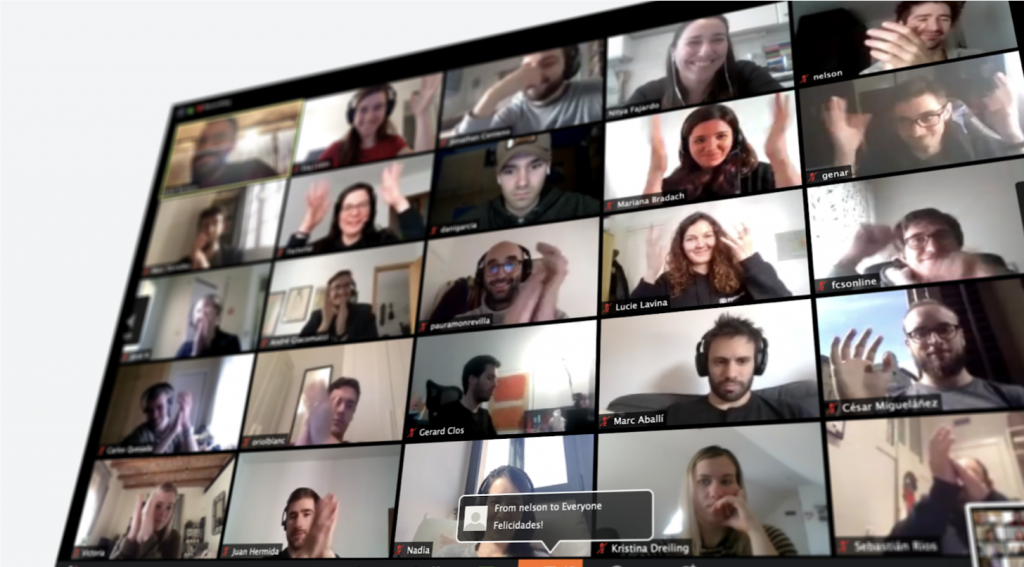
Every learning, every new thing that’s going on in the organization that is generating knowledge, you have to structure it. You have to organize it. Put it somewhere where people can have access to it. The faster people can get access to structured knowledge of what they were doing in the organization, the faster your company’s gonna grow.
Communication
Communication is always gonna be your number one organizational problem. If you ask a random employee what they think is the biggest problem, chances are they’re going to answer: communication. No matter how hard you work on it, it won’t be enough. You have to always work on communication.
For me, there are two kinds of communication, especially now that we’re remote:
- Asynchronous communication.
- Synchronous communication.
It is very important for a company to be productive. You need to enable and protect asynchronous communication. That means you don’t require everybody to answer right away. You don’t expect an answer when asking something on Slack, for example. You give people time to organize. Because when people are focused on something, they have to be able to finish it. You have to create this culture of « it’s okay not to answer right away ». Some people will be very focused on whatever they are doing. So you have to use tools that accept asynchronous communication.
For example, we are using Loom. Loom allows you to record your own screen and record yourself saying things and it automatically uploads it to the cloud, and you can share the link on Slack, or via email. That helps us, everyone focuses on their own thing without having to interrupt anyone. However, sometimes, you have to interrupt your team because something is important.
In that case, it’s better media than audio; better audio than chat and chat is better than e-mail. The closest thing to real-life interaction is going to be video. I always have a room, in Zoom, where people can just pop in and talk to me since I always have the same meeting open. Maybe sometimes people come over and I’m already with somebody else and this is kind of what happens in an office. We can share things that we’re doing. And this is actually creating an environment as if we were working together in an office. That is something I personally like very much.
To sum up, casual and spontaneous meetings are also important. The one on ones are more important than ever. So you need to have individual conversations with your team, be generous with time, and make sure you ask how are people feeling. You can ask open questions, personal questions about family, health, workouts, recipes…
It is very important at this time to let people think, reflect on the business, on what we’re doing, on the goals, on the vision, on everything. This is an opportunity to connect individually with the people, to make sure that we’re following the same vision. That’s one of the main responsibilities of managers.
Also, all the meetings should have a moderator because, without a moderator, meetings can be chaotic. Somebody has to make sure that everybody talks for a certain amount of time. It’s very important that every meeting has a purpose. Otherwise, we’re wasting everybody’s time.
We have weekly meetings where we review the goals of the week, what we’ve achieved, what we learned, what opportunities we’ve found.
Also, we keep having these informal afterworks where people gather and meet after work, and with a beer or whatever they’re drinking, we play games. It’s a space for things that don’t have anything to do with work, but it makes people feel connected, which is one of the biggest challenges when working from home.
I like people to share whatever their situation is like. Even if you have your kids or your pet around. You better come clean with it, because it’s going to interrupt at some point. You better share what your situation is like.
It’s very funny. I read an article the other day in which they talk about the 1918 Spanish flu. The Bell company was advertising: « Don’t worry, we have the infrastructure. You’re gonna be able to talk with your friends no matter where you are in quarantine ». Guess what happened when everybody started using the phone? Correct, the whole system collapsed.
During this current crisis, we have a perfect infrastructure to work remotely. We’ve been working remotely for years now. Actually, Zoom went from 10 million users, if I’m not mistaken, to over 200 million. And it works just fine. So let’s make sure we take advantage of it.
Building a digital office
Let’s talk about building a digital office, which is something that every company has to do. At Factorial, we are helping on all these items that I am listing here:
- Office management (employee portal)
- Time off and Time and attendance (who is working)
- Accessible company and employee documentation
- Hiring and onboarding new employees
- Performance management and surveys
- Employee data and reporting
- Sales, marketing and support
- Product and technology
- Finance and administration
The employee portal is where everybody has a place of reference. You can find all the company’s announcements. Here is where you can review what’s going on in the company, the events, who is working today, who is out sick, who has taken days off… Everything that has to do with the company communication.
You also have an employee directory at Factorial where you can check who is who. Now, it’s particularly difficult to know where or who are your colleagues. You can make sure that you know all teams, everybody who is working in the organization.
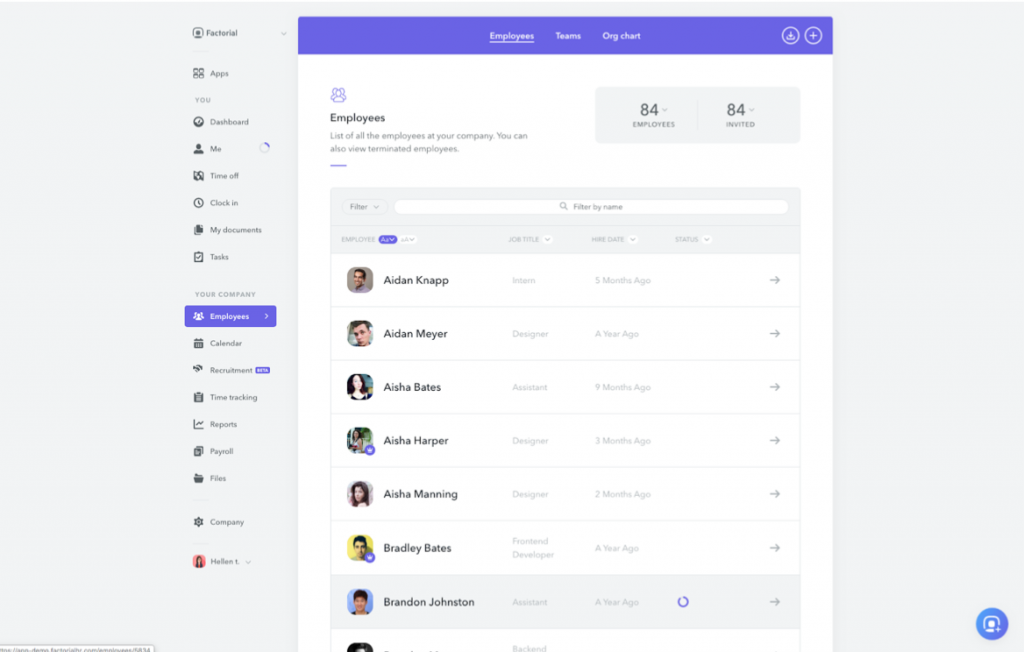
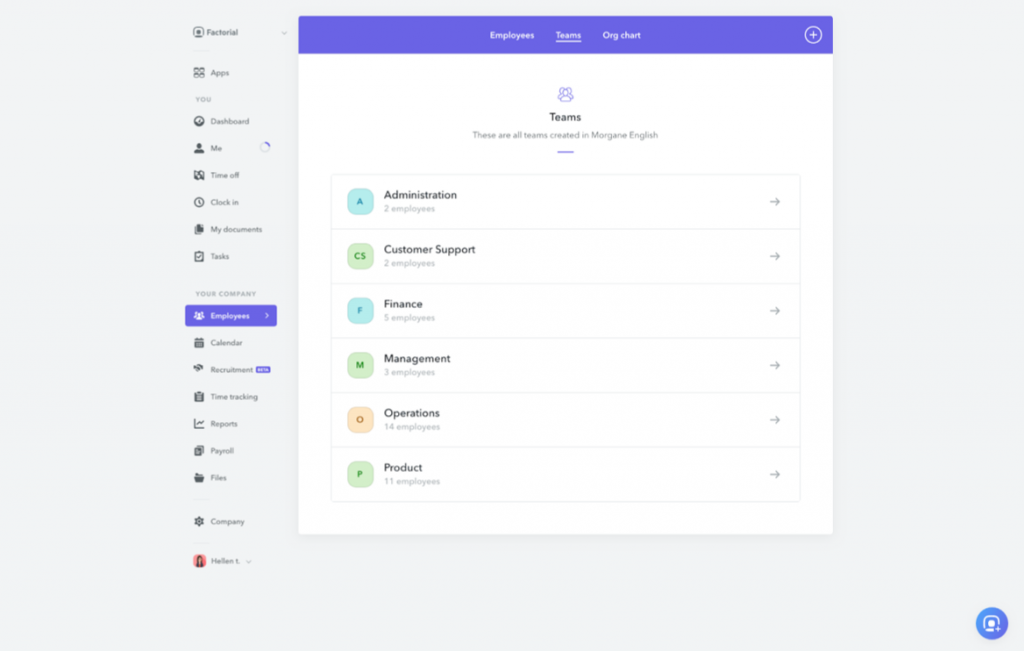
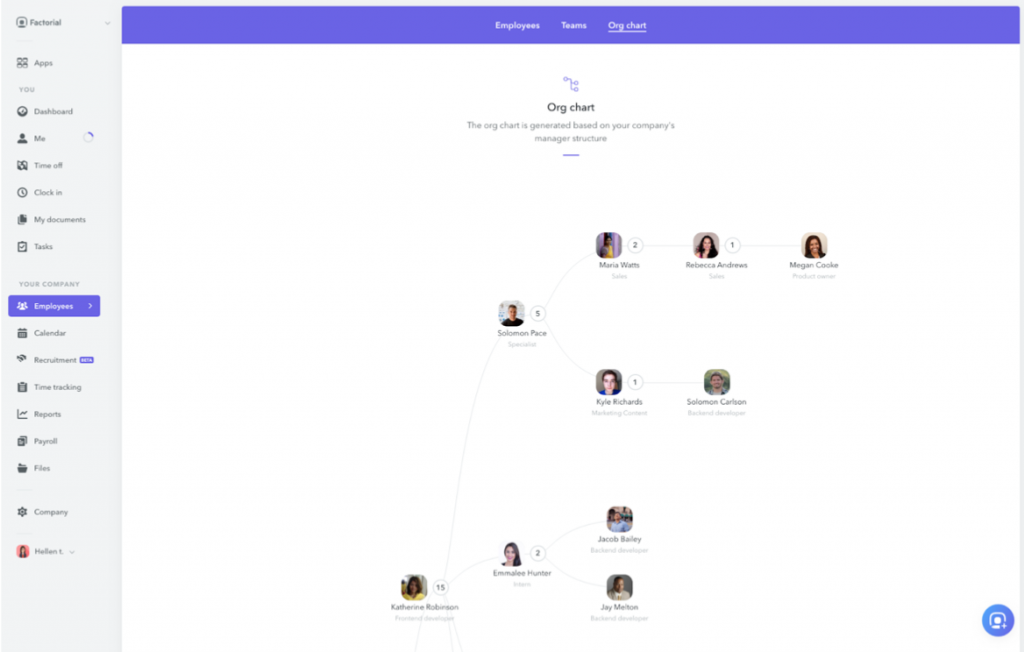
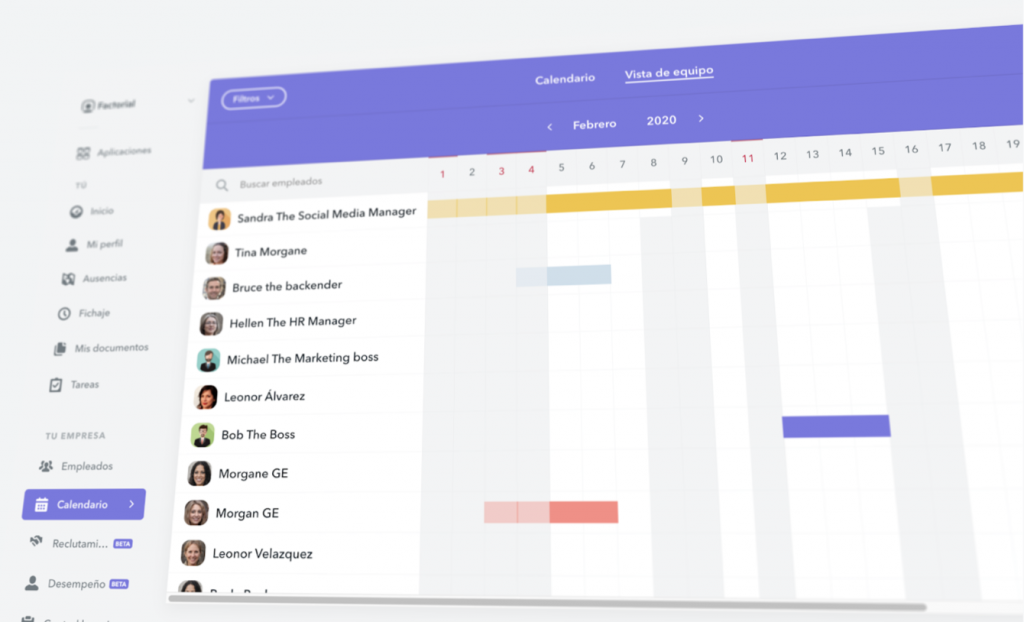
You can request time off and you can also track your time and attendance. Remember that in Spain, and many other countries, it’s mandatory to keep track of the working time. So here you can see who’s working and who’s not working. You can time track through a very easy app.
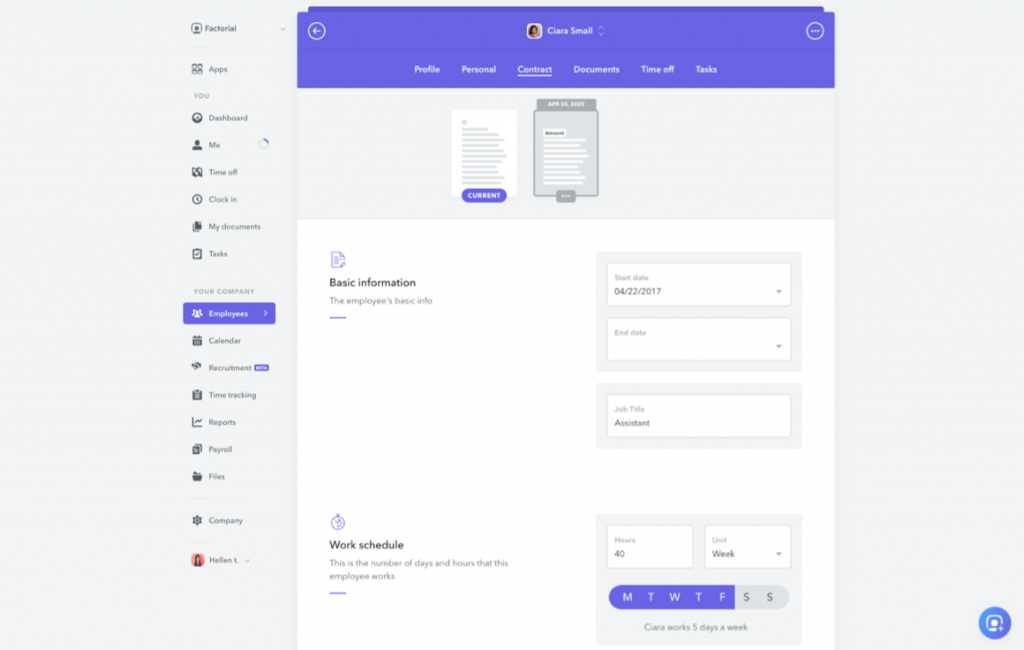


Also, you have all the documentation available and you can check all your contracts with all the history of changes and everything. All the employee information is in one single place. You can sign the contracts digitally, you don’t have to use paper anymore.
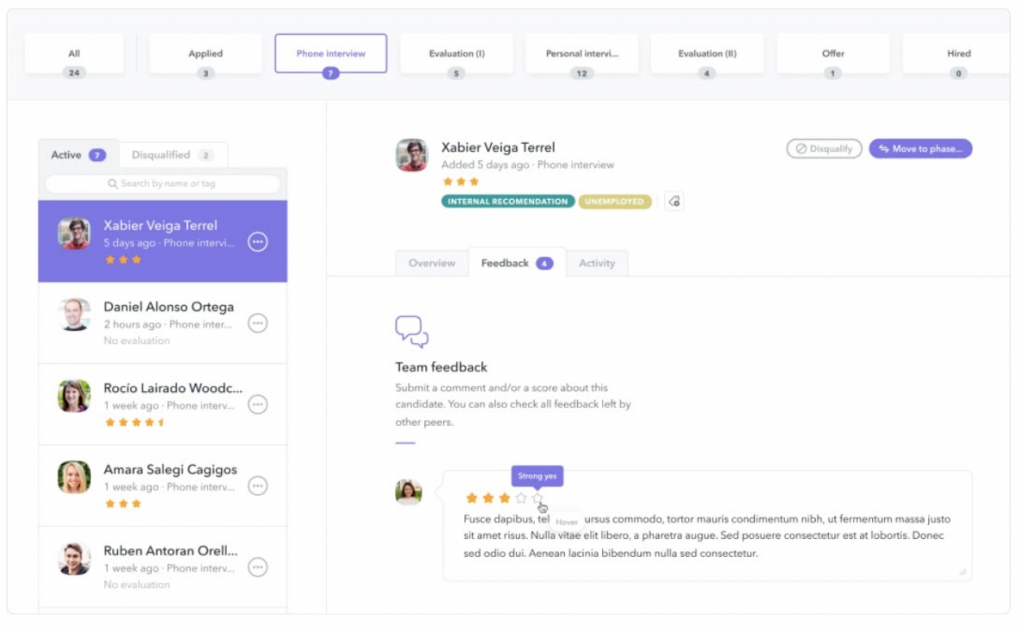
We also offer multi-stage, collaborative, and hiring CRM. It allows all the candidates to be stored and be assessed in one single place.
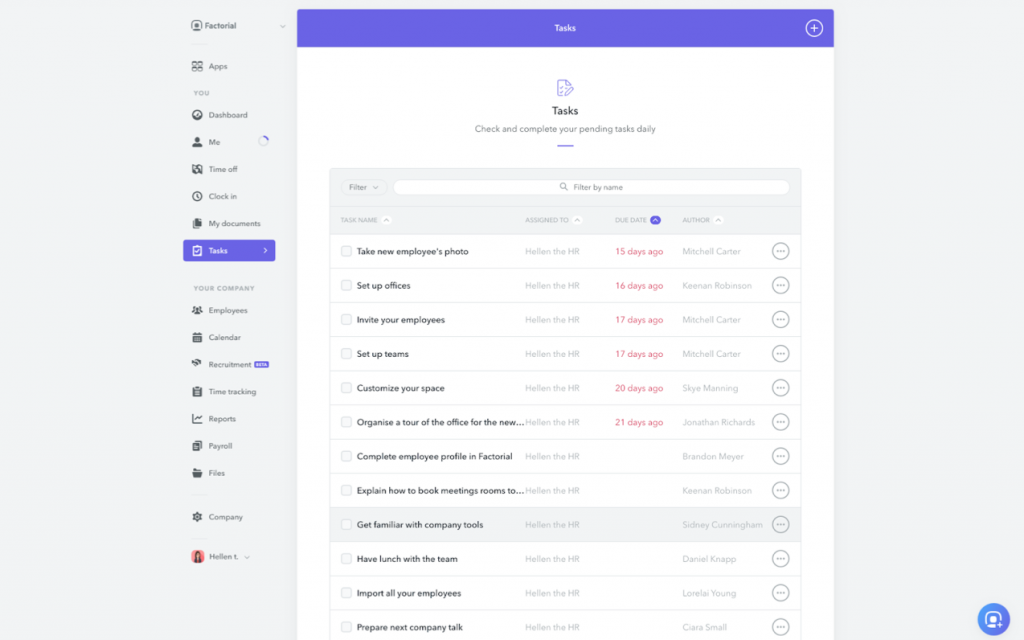
We also have a task management system that helps H.R managers and other managers to follow certain steps. For example, onboarding or offboarding an employee.
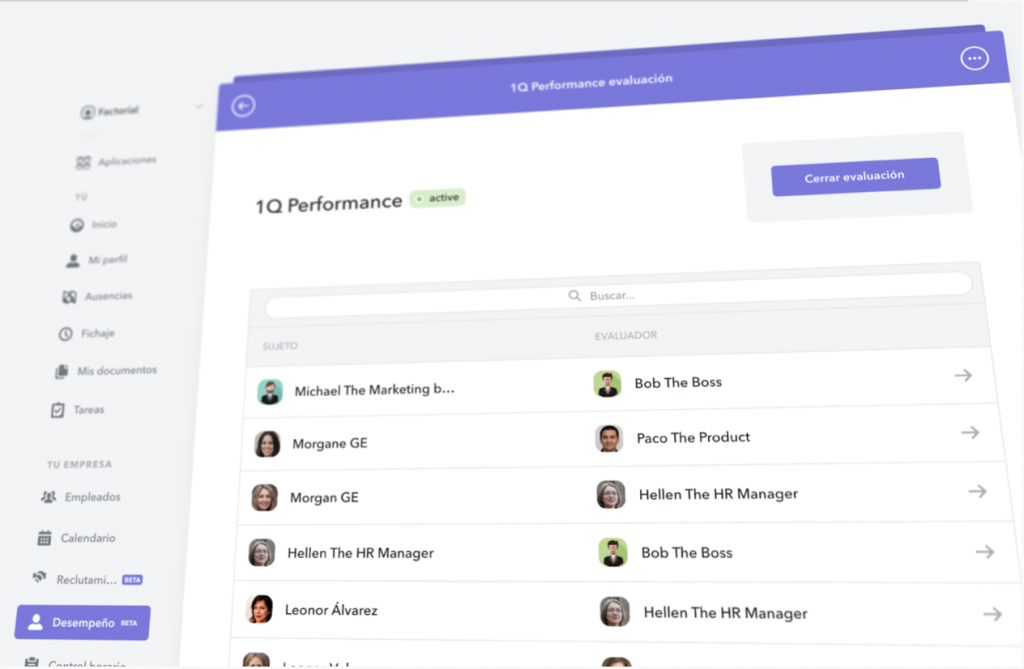
Factorial also offers a performance portal. Now is an important moment to have a performance review of your employees to make sure that everybody is aligned. People can review their own teams, their own managers.

We also offer the functionality of reporting. For example, at Factorial we were 58 people in March and now we’re more than 100 employees. We are growing really fast. You have access to the average age of the company, the nationalities… You can see the team diversity and everything that has to do with your employees.
Sales, marketing, support
I happened to manage Sales and Marketing at Factorial, and we are using a very accessible and collaborative budget.
We are all connected. For example, if you are spending some money in France in Content or a PR campaign, it’s going to have an effect on Sales, it’s going to have an effect on acquisition. Everything that we do in terms of go-to-market is in one single place connected. You can see the consequences of moving one euro from one channel to another. Another important aspect of marketing is CRM. We always talk about that, but now it’s particularly important: if something is not happening in the CRM, it’s not happening at all. CRM is where customer relationship management is, where all the client information lives.
Every interaction that we have, whether it’s a call, or an email, a note, a meeting, or a demo, it’s recorded, stored and it’s accessible in the CRM. If it’s not in the CRM, it didn’t happen.
Having all the information in one place will allow you to find out where the problems are, so the CRM is key.
Let’s talk about the sales playbook. It’s very important that every Sales norm is written down and properly structured in a sales playbook. How do we sell a particular industry? How do we sell geography? Every new learning is going to be structured and it’s going to be in the playbook. The better we write the playbook of how the sales process of our company works, the better the new reps are going to ramp up and learn, and the faster we are going to grow. This is the truth. The playbook will help communicate how things are working.
Another thing we’re using: video calls and recordings. We record everything we do. We organize it in a folder and link it in the playbook.
We are using our goal as a cloud-based call center. We prioritize the calls. We can split them into support, legal assistance, and so on. The same thing about the playbook works for Marketing and the content plan: what channels are we working on? What’s the tone? What does it have to do with our brand? Everything that has to do with our brand is written down.
Therefore, we are using a CMS, we’re using dashboards and metrics and they are accessible for everybody. We’re using Slack channels and, in the top description line, we put dashboards so people can just click and have all the information on what’s going on in that particular team, with a particular goal.
Product and development
In terms of product, everything is very digital, people are able to work together and collaborate through Airtable. We’re using it at Factorial to structure a roadmap. We use Google Docs to put all the goals that the teams have and expected outcomes. We use Figma to collaborate mostly between designers, but we also include Marketing on the Figma files. Also, we use Github for court control and collaboration.
Finance and administration
For finance and administration, there’s no point in having paper flying around. Everything is in the cloud. We’re using Quipu to manage the invoicing and the administrative process, and see what’s paid and not paid, etc.. But we use A3, which is a local Spanish accounting company, to do the accounting. We use Strive for the payments, Dropbox for the other documents that are not stored in Factorial, Excel for planning and controlling, and we use Google Docs and Spreadsheets for documentation.
Remote challenges
- Privacy and security
Say goodbye to on-premise systems and move to a cloud Password security (1password or similar)
- Infrastructure
Proper home internet connections
Proper phone lines
IT material
- Working space
Readapting home working areas
Corporate coworking and flexible spaces
Challenges that we never thought about are coming, which are privacy and security. Many people still have machines and servers in their offices and they have to get access to it. And that has become the number one problem in security.
Cloud company security standards are very modern and very secure nowadays. They use standard security protocols to protect your data. It’s gonna be way safer than using your own programs installed in your own offices. So you should start thinking if you haven’t done it already, to move everything to cloud services.
Managing passwords can be another challenge. So you have to make sure that you’re using a service to manage all the passwords. Make sure that every password is different for every service, and that they are complicated long passwords. We are using 1password, but there are many services for that issue.
Another challenge is controlling who attends the video calls. There have been many, many cases in which this has been compromised. You can’t see the faces of people dialing in from a phone, and they are listening to company secrets. So this is something you have to take into account and make sure you are protected.
My personal toolbox
My personal toolbox:
- Notion as my brain organizer
- Zoom (Pro) with fixed room ID to communicate
- Factorial for people management
- Slack (free) for project-specific discussion, or ramblings
- GDocs for every documentation
- Superhuman for email
- Airtable for structured data (roadmaps)
- Hubspot for ALL customer/prospect relevant info
- Hireflix for video-ATS
- Typeform and Videoask for rich surveys
- Linkedin / Twitter / Youtube for learning from others
- Spotify for background music
I basically use Notion to organize my brain. It’s a listing system so I can make lists based on different problems I have to work on. And it is very convenient because it allows me to structure information. I structure it always by time and dates, and within the subjects, everyone who can report to me has their own folder. It’s how I manage to organize everything, all the complexity. I hardly ever get stressed because I make lists. I’m gonna make the list again and again and again and something is just gonna fall and that’s just natural.
I’m reconsidering everything I have to do every day. So if I cannot do it, I cannot do it. Days are not going to have more than 24 hours. So I have to prioritize. I use a list for that Notion. I also use Zoom, Factorial, Slack, Google Docs, Superhuman, Airtable, Hubspot. Hireflix, which is an interesting asynchronous applicant tracking system to make interviews with two applicants in an asynchronous way. I use LinkedIn, Twitter, and YouTube for learning from others. I obviously use Spotify, too.
Embracing flexibility (in crowded homes)
- Make custom schedules
- Find time to think
- Build yourself a work space
- Make sure working slots are working slots (while it is possible)
- Still make time for yourself, your own stuff
- Enjoy richer time with your loved ones!
One important challenge that companies are going to have is how to embrace flexibility. People are going to be in crowded homes, so they have to be able to make their own schedules. They have to be able to work whenever they find themselves more productive.
You have to be flexible as a team leader, as a company, because there is no other way around. You cannot set rules in your office anymore. So you have to be flexible. You have to make sure that you can work in a flexible way, in a synchronous way. And you have to tell people to find time to think. It’s not about doing tasks. We have to be able to give ourselves time to think what we’re doing, to prioritize, because otherwise we’re gonna start stressing.
Furthermore, we have to build ourselves a working space, make sure that we allocate slots for working, and then that we are working on those slots, if that’s possible. Of course, we still have to have time for ourselves and, you know, work out and do healthy stuff even if we’re at home. If we are not feeling healthy, physically, and mentally, we’re not going to be working properly.
Managing stress and loneliness
- Stress is often related to how we prioritize and manage throughput -> Make lists, it’s ok to not complete them
- Loneliness is the number one problem for most people
- Be open about how you feel, we are all there
- Make new/old friends and talk about it
- Workout hard
- Learn, train, read, dance, cook
- Find out about new hobbies
- Stop reading about COVID-19!
People get stressed at home and they feel lonely but nobody talks about it. It’s a perfect opportunity to talk about how you’re feeling with other people because you’re going to find out that everybody’s in the same situation.
It’s a good time to reconnect with old friends or make new ones. It’s also a good time to workout, learn, train, find new hobbies. Stop reading about coronavirus, it’s gonna drive you crazy. Just find things to do. I, for example, never cared about plants, and now I’m learning about plants and I ordered some online and I am learning how to take care of them.
Changes are here to stay
- Opportunity to rethink, reset, reinvent at business and individual levels
- Remote work will be the new normal
- If done well, companies will be more productive/competitive
- Talent pool available worldwide
- New ways of collaboration, more flexible and liquid work
- New business opportunities will appear
- e-commerce, health care, and health tech, games, and entertainment, coaching, training and remote education, online support, food as a service, flexible coworking, home decoration, home gadgets, online fitness…
- The whole ecosystem will become digital
- efficiency, automation, better data, better decisions
These changes I’m talking about are here to stay. Don’t think for a second that once companies have set up all these rules, all these processes to work remotely, to work digitally, they’re going to come back to their office and work as they did before. That’s not gonna happen. Companies are finding out that they can be more productive, more competitive. New opportunities are appearing. We’re adapting to work remotely, so work is gonna become more flexible.
We can access a whole world pool of talent right now. We don’t have to stick to our own local environment. So that’s gonna make us more productive. We already have the process to incorporate all these people. We cannot abandon this opportunity. So we see everything that’s changing and we ask ourselves, how can we help society? How can we help in this new process and these new needs that are showing up? This is gonna be the difference between the companies that survived and the companies that died, because many companies are gonna die, unfortunately.
You have to make sure that you are leading the change and not resisting it. Usually, these changes take years, but now they’re going to take months. So we have to be in the leading position. We have to take advantage of the new opportunities, such as e-commerce, healthcare, games, and entertainment, coaching, training and remote education, flexible offices, decoration, you name it, you name it.
Finally, everything is going digital, which means every supplier that we have is gonna be digital. Every client that we have is gonna be digital. We can focus on the strategy, on ideas, on how to be better, how to make better decisions.
We have to understand that this new whole ecosystem will be digital. Therefore, we have to lead the digital change. So this is all for today.
Bernat Farrero, the founder of Itnig, held a webinar on how to enable remote work in your team. Not every company was ready for their team to work remotely.
Hopefully, this article has given you some advice on how to handle the current situation we are living in. As Bernat mentioned, “we can access a whole world pool of talent right now ».
You can find the webinar here. If you want to hear more of Bernat and Itnig, we invite you to listen to our weekly Itnig podcast.
